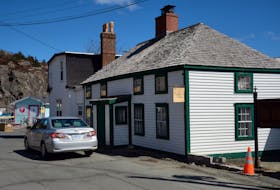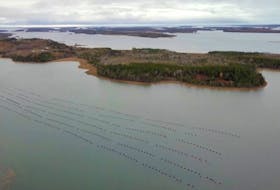Among the unusual things about Black Harbour Distillers in Hubbards is that it’s owned and run by a 20-year old woman who’s also a full-time student, and that it is not, technically, a distillery.
Jaime Landry recently celebrated her first year in business, just before she started her third year at Dalhousie University.
Her retail space in a former two-room schoolhouse is much bigger than what she originally looked for, but has turned out to be perfect in the time of COVID.
“I really had no idea what to expect for this summer, and everyone comes in and says it must suck to have to open during this,” Landry said. “Honestly, the local support and people coming down here and visiting, it’s been insane. And we have such a big space it’s been easy to follow protocols.”

Landry grew up in Bedford but spent summers in Hubbards, and knew that was where she wanted to start her first business.
“Since I was a little girl, I always wanted to be a boss,” she said. “I didn’t know what I wanted to be a boss of, I just wanted to be a boss.”
Black Harbour shut its doors for three months beginning in March, and stayed in business by doing free deliveries from Chester to HRM. Landry said those customers now come to the distillery.
“I have my distiller’s license…but we don’t have a still on site,” she said. “I’m not hiding the fact that we don’t have a still, I’m very transparent about our process and people appreciate that. I import all my alcohol, it comes in at 95 per cent or higher, a raw product, and our process is cutting and cleaning it. We put it through a charcoal filter cleaning system three to six times, depending on what product we’re doing. My goal is to use as many local extracts as I can, so for my blueberry vodka, the blueberries are from Lunenburg, the maple in the maple rum is from New Ross. Obviously my white Caribbean rum is not too local.”
Landry’s father is her mentor, and her boyfriend is her only employee, but both of them were skeptical when she told them about her plan to make a cotton candy vodka. Trusting her instincts, she went ahead anyway.
It’s sold out three times.
“I’ve had to triple production on that,” she said. The first batch I did was 250 bottles and I sold out in two days, and that was all through deliveries….Then I made it again and I decided not to do deliveries, just have it sold here and be first come, first served. We made double the amount, and that sold out in three hours. There was a lineup, and I was labelling it and selling it.”
“My goal is get out products that are super clean, with a lot of different flavours, quite fast. So far, it’s been working.”
Prosperity and production shift
COVID hasn’t been that good to all distillers.
Mike Beamish of Deep Roots Distillery in P.E.I. depends on tourism for much of his sales. He sells his products on site at the distillery, at the market in Charlottetown and in provincial liquor stores.
Most years, he sells large quantities of his specialty products to tourists from Ontario and Quebec, but his non-liquor store sales are way down this year.
“On my distillery side we’re going to be down about 60 per cent in revenue. Now, we’ve taken the time to work on a couple of projects that hopefully will pay off as an investment next year,” said Beamish, who’s also introduced a new product. “It’s like our moonshine. What’s unique about it is our filtration process, we’ve developed a custom filtration that incorporates oyster shells. It adds something neat to the flavour.”
Deep Roots also got into the hand sanitizer business, “which saved our year for us.”
The Newfoundland Distillery Company also got into hand sanitizer to help stave off disaster.

The company had just opened a new tasting room that was starting to take off when COVID hit,
so Peter Wilkins, co-founder of the distillery, connected with Customs and Excise and Health Canada for permits and a formula for hand sanitizer.
“The tasting room became the bottling plant,” he said. “We made as much as we could and we couldn’t make it fast enough. We’ve stopped making it, but we have some in stock and we could make more if need be, but luckily we caught up with the demand.”
COVID also slowed another project that was already behind schedule, an expansion of the plant that was finally finished in July.
“Basically, we can produce about four times as much as we could before,” said Wilkins. “In a year we do about 50-thousand litres of various spirits.”
The distillery uses barley grown in western Newfoundland in some of its products, and recently celebrated a second consecutive award for Best Spiced Rum in Canada at the World Rum Awards.
Its Gunpowder and Rose was the winner this year, Chaga Rum last year.
“I’d like to say it was a master plan, but it was really just sheer luck,” Wilkins said. “We sent the Chaga first time and were amazed so we sent the Gunpowder this time. Love the fact we got it two years running, I’m not sure what we do next year- do we send them both in?”








